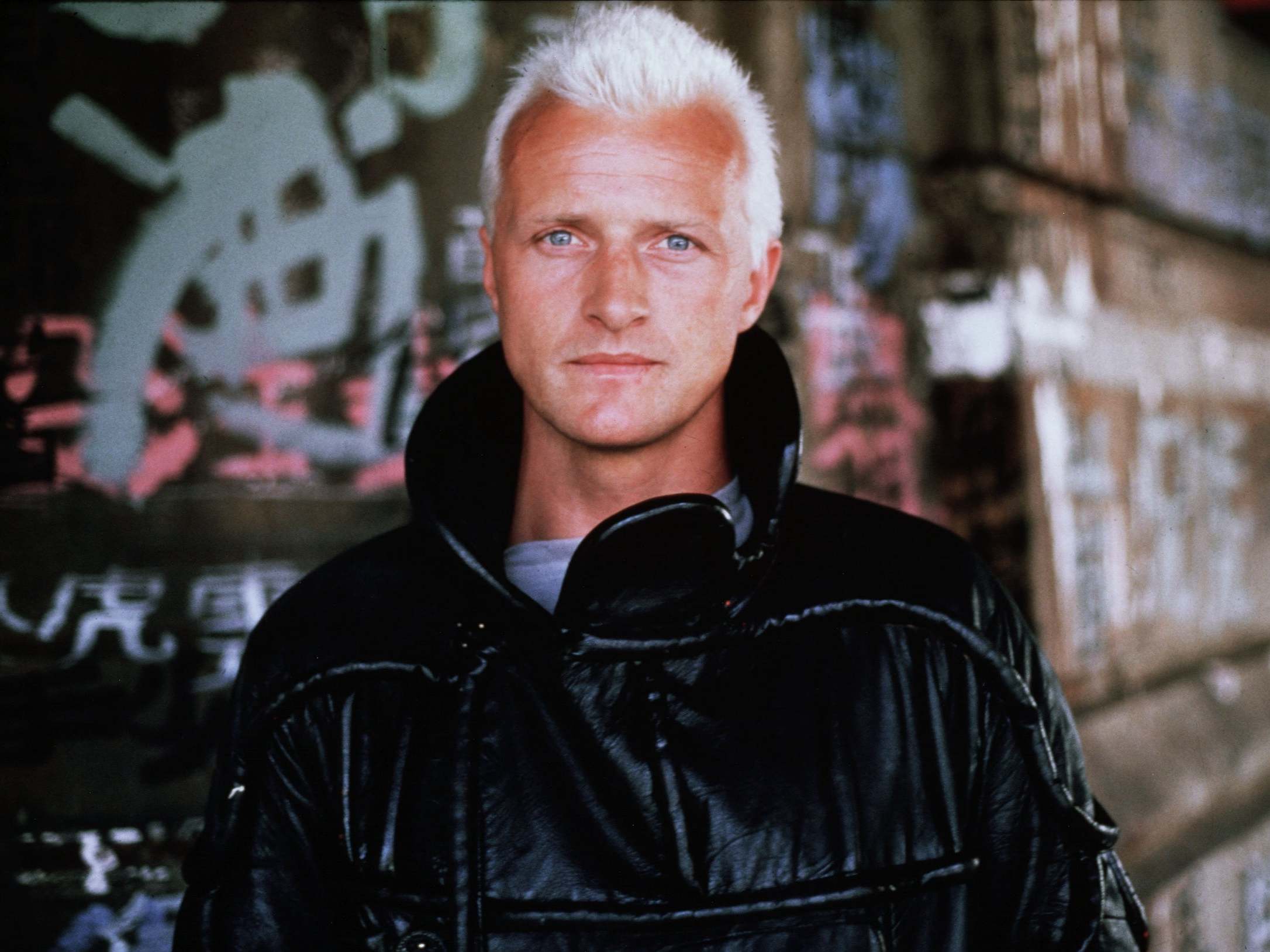Rutger Hauer: Actor and Blade Runner star forever associated with android role
His icy stare and droll humour made him a staple of action and horror films, if never quite a household name

Rutger Hauer was a rugged Dutch actor who played Nazis, action heroes and bloodsucking vampires, but who was best known as the android outlaw in the 1982 science-fiction thriller Blade Runner.
The blond-haired, blue-eyed Hauer – who has died aged 75 – was scarcely known when he burst off the screen in the Ridley Scott-directed classic as a bioengineered android, or “replicant”, pursued by Harrison Ford.
Adapted from a novel by Philip K Dick, the film was a neo-noir drama set in a dystopian future of giant corporations, overcrowded cities and environmental ruin – the year was 2019 – in which replicants are hunted down by special police known as Blade Runners.
Although it opened to mixed reviews, the film is now highly regarded, with studies devoted to its examination of what it means to be human. The movie propelled the career of Hauer, whose square-jawed figure, icy stare and droll humour helped to make him a staple of action and horror films, if never quite a star.
He won a Golden Globe for best supporting actor for Escape from Sobibor, a 1987 TV movie about an uprising at a Nazi death camp – he played the Jewish hero, against type – and in 2005 was a morally corrupt Catholic cardinal in Sin City and a greedy Wayne Enterprises executive in Batman Begins.
Hauer also starred in the 1985 medieval fantasy Ladyhawke, alongside Matthew Broderick and Michelle Pfeiffer; played a vampire king in the 1992 movie Buffy the Vampire Slayer; and ruled a supernatural tribe in the HBO series True Blood.
But he remained indelibly linked with Roy Batty, the murderous Blade Runner replicant who is programmed with a lifespan of four years. Hauer, wrote The New York Times, was “by far the most animated performer in a film intentionally populated by automatons”, and “often upstaged” Ford’s hard-boiled detective, Rick Deckard.
Rutger Oelsen Hauer was born in the Dutch town of Breukelen in 1944, and raised in nearby Amsterdam, where his parents ran an acting school. He was performing onstage by five and ran away from home at 15 to work on a freighter with the merchant marine.
He began learning languages, ultimately mastering half a dozen, and after a year at sea returned to the Netherlands to work as a carpenter, gardener and electrician. Night school didn’t suit him, nor did acting school, and he dropped out to join the army. Once again, he said he felt bored and out of place.
“It was another one of those so-called macho scenes – I just didn’t fit in,” he said in 1981. “So I played the sad soldier missing his mother and having problems adjusting, which was true – I was having problems adjusting, so they discharged me from the army. Then I finally was more motivated and managed to do the discipline thing.”
Hauer tried drama school again and came to describe acting as “the urge to, let’s say, fulfil a certain black hole in you”. He worked in a rural touring company, performing plays by Samuel Beckett and Harold Pinter, and was launched to Low Countries stardom in 1969 on the medieval television series Floris, a kind of Dutch twist on Ivanhoe.
The series was directed by Paul Verhoeven, who went on to cast Hauer in movies including Turkish Delight (1973), an Oscar-nominated Dutch blockbuster, as well as Soldier of Orange (1977) and Spetters (1980), which found some arthouse success in the US.
For his first American role, Hauer played a terrorist in the 1981 Sylvester Stallone thriller Nighthawks. One month before the release of Blade Runner, he portrayed Nazi architect Albert Speer in the TV movie Inside the Third Reich.
Hauer reunited with Verhoeven for the 1985 medieval drama Flesh and Blood; one year later, he played a homicidal hitchhiker in The Hitcher and a bounty hunter in Wanted: Dead or Alive, an adaptation of the Steve McQueen TV western.
He also made millions of dollars as the face of an advertising campaign for Guinness beer and starred as an alcoholic homeless man in Italian director Ermanno Olmi’s The Legend of the Holy Drinker (1988), which won the top prize at the Venice Film Festival.
But Hauer, who described himself as “a very nonviolent person”, soon returned to the menacing characters that made him famous. He starred as an SS officer in the TV movie Fatherland (1994), was a vampire in the TNT miniseries Salem’s Lot (2004, adapted from a Stephen King novel) and played a bloodthirsty businessman in The Sisters Brothers (2018), a western starring John C Reilly and Joaquin Phoenix.
“It’s so much fun to playfully roam into the dark side of the soul and tease people,” Hauer said in 1987. “If you try to work on human beings’ light side, that’s harder. What is good is hard. Most people try to be good all their lives. So you have to work harder to make those characters interesting.”
His marriage to Heidi Merz ended in divorce, and in 1985 he married Ineke ten Kate, an artist. In addition to his wife, survivors include a daughter from his first marriage.
Rutger Hauer, actor, born 23 January 1944, died 19 July 2019
© Washington Post
Subscribe to Independent Premium to bookmark this article
Want to bookmark your favourite articles and stories to read or reference later? Start your Independent Premium subscription today.

Join our commenting forum
Join thought-provoking conversations, follow other Independent readers and see their replies